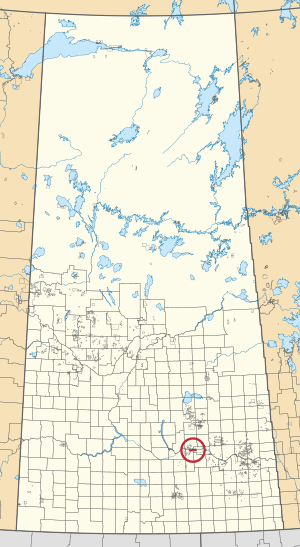Muscowpetung 80 facts for kids
Quick facts for kids
Muscowpetung 80
|
|
|---|---|
| Muscowpetung Indian Reserve No. 80 | |

Location in Saskatchewan
|
|
| First Nation | Muscowpetung |
| Country | Canada |
| Province | Saskatchewan |
| Area | |
| • Total | 8,849 ha (21,866 acre) |
| Population
(2016)
|
|
| • Total | 275 |
| Community Well-Being Index | 54 |
Muscowpetung 80 is a special place in Saskatchewan, Canada. It is an Indian reserve that belongs to the Muscowpetung Saulteaux Nation. This community is located about 31 kilometers west of Fort Qu'Appelle. It sits near the south-west shore of Pasqua Lake, which is one of the beautiful Fishing Lakes.
Contents
Muscowpetung 80: A Special Community
Muscowpetung 80 is an official Indian reserve in the province of Saskatchewan. It is home to members of the Muscowpetung Saulteaux Nation, a First Nation community. The reserve covers an area of about 8,849 hectares. This is roughly the size of 12,000 football fields!
Where is Muscowpetung 80 Located?
This community is found in the Canadian province of Saskatchewan. It is about 31 kilometers west of the town of Fort Qu'Appelle. Muscowpetung 80 is situated along the south-west shore of Pasqua Lake. Pasqua Lake is one of four connected lakes known as the Fishing Lakes. These lakes are popular for fishing and other water activities.
Lake Muscowpetung
There is also a smaller lake called Lake Muscowpetung. This lake is located right on the Muscowpetung Indian Reserve. It is along the Qu'Appelle River. Sometimes, people consider Lake Muscowpetung to be one of the Fishing Lakes too. It sits just west of Pasqua Lake.
What is the Community Like?
In 2016, a count of the population was done. It showed that 275 people lived in Muscowpetung 80. These residents lived in 87 of the 112 homes on the reserve.
Community Well-Being
The "Community Well-Being Index" helps measure how well a community is doing. This index looks at things like education, jobs, and income. In 2016, Muscowpetung 80 had a score of 54 out of 100. This score was compared to other communities. The average score for First Nations communities was 58.4. For communities that are not Indigenous, the average score was 77.5.
 | James Van Der Zee |
 | Alma Thomas |
 | Ellis Wilson |
 | Margaret Taylor-Burroughs |

